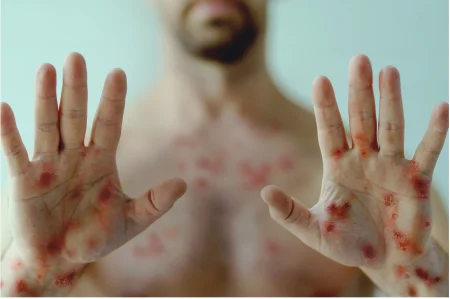Syphilis is a sexually transmitted infection (STI) caused by the bacterium Treponema pallidum. If left untreated, it progresses through several stages, starting with painless sores, followed by rashes, and potentially leading to severe long-term health complications such as heart and brain damage. Syphilis treatment in Mumbai is widely available, and the condition can be effectively treated with antibiotics, especially if diagnosed early. It’s essential to seek syphilis treatment near me to avoid serious complications. Finding a reliable hospital for syphilis treatment can ensure prompt diagnosis and appropriate care. Early detection, education on safe sexual practices, and regular screenings are crucial in preventing the spread of syphilis and reducing its impact on overall health.
What is Syphilis?
Syphilis can be described as a sexually transmitted disease (STI) that is caused by bacteria Treponema pallidum. It can progress through different stages if not treated, beginning with the appearance painful sores that are then followed by the appearance of a rash, possibly leading to more severe health problems when not treated properly. Although it is treatable with antibiotics the condition can lead to significant health problems if it is not addressed and causes damage to the brain, heart as well as other organs. A prompt diagnosis and timely treatment is essential to treating syphilis and preventing severe consequences.
How Does Syphilis Occur?

Syphilis spreads primarily through directly touching a sore or lesion that occurs during sexual actions. The infection is transmitted through vaginal, oral or anal sexual contact. Syphilis is also transmitted through a pregnant woman suffering from the infection to her infant and can result in congenital syphilis. The bacteria infects the body via breaks in the mucous membranes or skin in sexual contact, which can make sexual contact that is not protected a significant risk factor in developing the disease.
How Common is Syphilis?
- Primary Stage Primary Stage :- This is the initial apparent sign of syphilis lasting between 10 and one hundred days post-exposure. It usually manifests as an innocuous sore or a painful an ulcer known as a chancre located in the area of infection, which could be the genital region, anus or mouth. The sore typically heals naturally within several weeks, but the infection is still present within the body.
- Secondary Stage :- The stage can occur between a few weeks and months following the primary stage. The symptoms include a rash typically located on hands or the soles of the feet, and symptoms of flu like sore throat, fever, lymph nodes that are swollen, and muscle pains. The rash could be caused by mouth ulcers and genitals or anus.
- The Latent Stage :- When syphilis has not treated during the second stage, the infection can progress to the latent stage, in which there are no signs or symptoms however, the bacteria are still within the body. Latent stages can be long-lasting and if it is not treated the disease could advance to the tertiary phase.
- Tertiary Stage :- This phase may occur between 10 and 30 years after the first infection if the syphilis is not treated. Syphilis tertiary can cause serious harm to organs, such as the brain, heart eye, nerves, eyes as well as other organs. It can cause neurological issues as well as heart disease and dementia.
Syphilis is a fairly frequent STI particularly in sexually active people. It affects both females and males however, the risk is more prevalent for men who are sexually active with males. The CDC states that rates of syphilis have been on the rise in recent times, particularly in urban regions. Syphilis is common among young adults, and is typically diagnosed in individuals aged 15-40. Early detection and education on appropriate sexual behavior are vital in battling the rising rates of syphilis.
Symptoms of Syphilis
The symptoms of syphilis be different depending on the severity of the disease. The four stages of syphilis are:
Treatment of Syphilis
Syphilis is curable and treatable particularly in the initial stages. The primary treatment for syphilis is antibiotics generally penicillin. Most people find that one dose of penicillin will suffice to treat the infection in the primary and secondary stage. People with syphilis in later stages may require more doses or longer course of antibiotics.
The early diagnosis and treatment is vital to avoid any complications. If not treated the disease can cause serious organ damage, such as eye problems, heart issues and neurological problems. It is crucial for people with a sexually-active lifestyle to be regularly examined in order to identify STIs and for those who exhibit symptoms of syphilis, to seek medical attention immediately. In addition, the sexual companions of those who are infected must be screened and treated in order to avoid re-infection.




